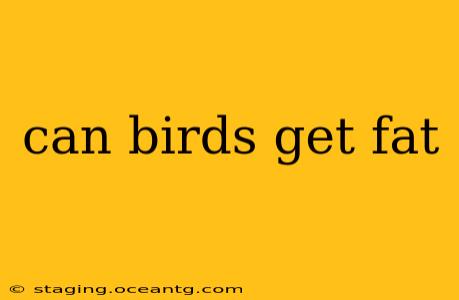Yes, birds can absolutely get fat, just like any other animal. While we might not see plump robins waddling down the street as often as overweight cats or dogs, avian obesity is a genuine concern, impacting their health and lifespan. Understanding the causes, symptoms, and consequences of fat birds is crucial for bird enthusiasts and anyone concerned about the well-being of our feathered friends.
What Causes Obesity in Birds?
Several factors contribute to weight gain in birds. Understanding these root causes is the first step towards preventing and addressing avian obesity:
-
Overfeeding: This is a primary culprit. Providing too much food, especially high-calorie foods like seeds rich in fats and oils, can lead to weight gain. Many commercially available birdseed mixes are heavily weighted towards these types of seeds, making it easy to unintentionally overfeed.
-
Lack of Exercise: Birds need ample space to fly, forage, and engage in natural behaviors. Caged birds, especially those in small cages or lacking sufficient enrichment, are at higher risk of obesity because they have limited opportunities for physical activity.
-
Unhealthy Diet: A diet lacking in essential nutrients or heavily reliant on processed foods can lead to weight gain and health issues.
-
Underlying Medical Conditions: Certain diseases and hormonal imbalances can contribute to weight gain in birds. Hypothyroidism, for example, can slow metabolism and lead to obesity.
What are the Symptoms of an Overweight Bird?
Identifying an overweight bird requires careful observation. While it can be challenging to visually assess the exact body condition score in birds, some clear signs indicate potential obesity:
-
Visible Fat Deposits: Look for excessive fat deposits around the breast, keel (breastbone), and legs. A bird's breastbone should be easily palpable; if it's difficult to feel, it could be a sign of excess fat.
-
Difficulty Flying or Moving: An overweight bird may struggle to fly or move around with the same agility as a healthy bird.
-
Lethargy and Decreased Activity: Loss of energy and decreased activity levels are common in obese birds.
-
Respiratory Problems: Excess weight can strain the respiratory system, leading to difficulty breathing.
-
Feather Changes: In some cases, overweight birds may show changes in feather quality, such as dullness or loss of luster.
How Can I Help My Bird Lose Weight?
If you suspect your bird is overweight, consult an avian veterinarian immediately. They can properly assess your bird's condition and recommend a weight-loss plan tailored to its specific needs. In general, a weight loss plan will include:
-
Dietary Changes: This usually involves switching to a balanced, low-fat diet formulated specifically for birds. A veterinarian can advise on the appropriate type and quantity of food.
-
Increased Exercise: Providing more opportunities for flight and foraging, through larger cages or outdoor aviaries with appropriate safety measures, is vital. Interactive toys and puzzles can also help keep your bird active and stimulated.
-
Monitoring and Regular Check-ups: Regular weigh-ins and veterinary visits are crucial to track progress and make any necessary adjustments to the weight-loss plan.
Can Wild Birds Get Fat?
Yes, wild birds can also become overweight, although it's less common. Factors like readily available human-provided food, especially high-calorie foods, or alterations to their natural environment can contribute to obesity in wild birds.
What are the Health Risks of Obesity in Birds?
Obesity in birds, like in humans and other animals, is linked to several health problems, including:
-
Liver Disease: Fatty liver disease is a common complication of avian obesity.
-
Heart Disease: Excess weight strains the cardiovascular system, increasing the risk of heart problems.
-
Diabetes: Obesity increases the risk of developing diabetes in birds.
-
Arthritis: Extra weight puts additional stress on joints, increasing the risk of arthritis.
-
Decreased Lifespan: Obesity significantly shortens the lifespan of birds.
By understanding the causes, symptoms, and consequences of obesity in birds, we can take proactive steps to ensure the health and well-being of our feathered friends, whether they are pets or wild birds we observe in their natural habitats. Always prioritize a balanced diet, appropriate exercise, and regular veterinary check-ups to maintain their optimal health.
